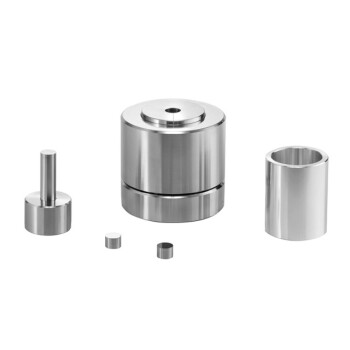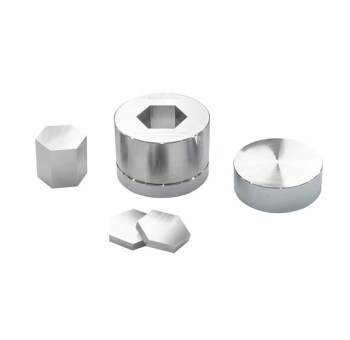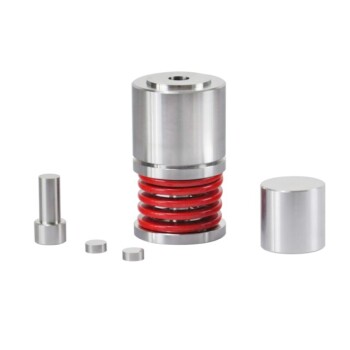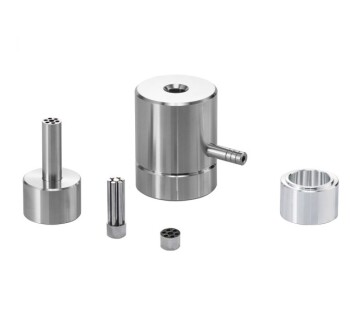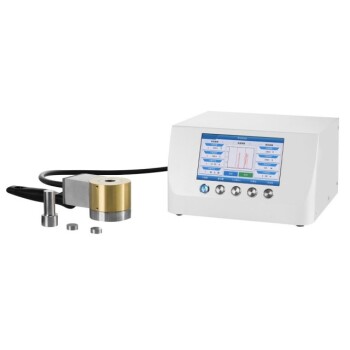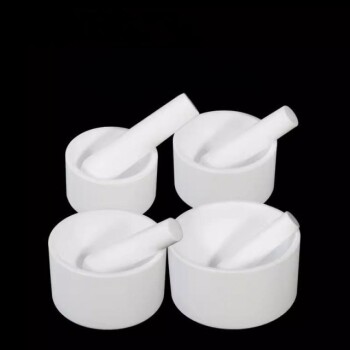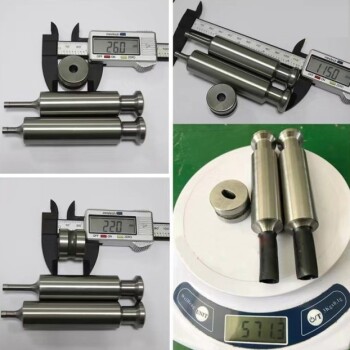At its core, the difference between CBD isolate and CBD distillate comes down to purity versus profile. CBD isolate is the purest form of CBD, a single-molecule powder. CBD distillate is a highly refined oil that contains CBD along with a spectrum of other cannabinoids and plant compounds, but with impurities removed.
The choice is not about which is superior, but which composition best suits your goal. You are deciding between the singular effects of pure CBD (isolate) and the potential synergistic benefits of multiple plant compounds working together (distillate).
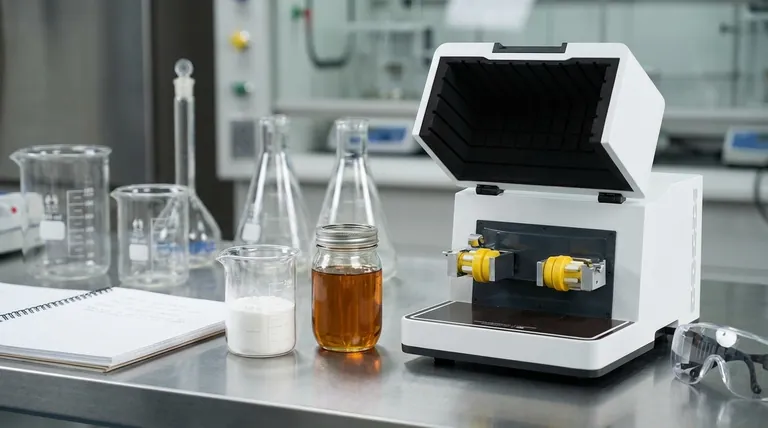
What is CBD Isolate?
CBD isolate represents the highest level of purity available. It is the cannabidiol molecule in its most concentrated form, stripped of all other plant material.
The Definition: A Crystalline Solid
CBD isolate is a fine white powder that is 99%+ pure CBD. It contains no other cannabinoids, terpenes, flavonoids, or plant waxes.
Because of this intensive purification process, isolate is completely flavorless and odorless, making it a highly versatile ingredient.
The Goal: Complete Separation
To create isolate, processors take a refined CBD extract (often a distillate) and subject it to further filtering and purification steps that methodically remove every compound that is not CBD. The final product is a crystalline solid, which is then ground into a powder.
What is CBD Distillate?
CBD distillate is a thick, viscous oil—often with an amber or golden hue. It is highly refined but, by design, is not 100% pure CBD.
The Definition: A Refined Oil
Distillation is a process that separates compounds based on their boiling points. In cannabis extraction, it's used to remove undesirable components like waxes, fats, and chlorophyll from a crude extract.
The result is a potent oil rich in cannabinoids. This oil forms the basis for two main types of products.
Full-Spectrum Distillate
This type of distillate contains a wide array of cannabinoids, including CBD, minor cannabinoids (like CBG and CBN), and trace amounts of THC (legally under 0.3% in the U.S.). It also retains some of the original plant terpenes, which provide aroma and flavor.
Broad-Spectrum Distillate
Broad-spectrum distillate is essentially full-spectrum distillate that has undergone an additional process to specifically remove the THC. It still contains CBD and other minor cannabinoids and terpenes, offering a middle ground.
The Core Difference: Purity vs. The Entourage Effect
The fundamental distinction lies in the intended final profile of the product and its theoretical effect.
Isolate: The Principle of Purity
The philosophy behind CBD isolate is to deliver the effects of a single, known molecule without interference from other compounds. This is ideal for those who need to guarantee a zero-THC product.
Distillate: The "Entourage Effect" Principle
The "entourage effect" is the theory that cannabis compounds work better together than they do alone. According to this principle, the presence of other cannabinoids and terpenes in a distillate can work synergistically with CBD to enhance its potential benefits.
Full-spectrum distillate is most associated with this effect. Broad-spectrum aims to provide a similar synergistic benefit without the presence of THC.
Understanding the Trade-offs
Choosing between these two forms involves practical considerations that go beyond their chemical makeup.
THC Content and Drug Testing
This is a critical factor. CBD isolate is the safest choice for anyone subject to rigorous drug testing, as it is stripped of all detectable THC.
While legal, the trace amounts of THC in full-spectrum distillate could, with heavy and consistent use, potentially trigger a positive result on a highly sensitive drug test. Broad-spectrum distillate is designed to eliminate this risk, but the quality of THC removal can vary between producers.
Flavor and Application
Isolate's neutral taste makes it easy to add to foods, drinks, or cosmetics without altering the flavor profile. Distillates, especially full-spectrum, retain an earthy, botanical flavor that some find unpleasant.
Therapeutic Approach
If your goal is to target the effects of CBD alone, or if you have a known sensitivity to other cannabinoids like THC, isolate provides a controlled and predictable experience. If you believe in the holistic approach of using the whole plant, a distillate is more aligned with that philosophy.
Making the Right Choice for Your Goal
Your selection should be guided by your personal health goals, lifestyle, and any workplace requirements.
- If your primary focus is a guaranteed 0% THC product: Choose CBD isolate. It offers the highest purity and eliminates any concern about psychoactive effects or failing a drug test.
- If your primary focus is experiencing the entourage effect without THC: Choose a broad-spectrum CBD distillate. This gives you the benefit of other cannabinoids and terpenes while removing the THC.
- If your primary focus is the full plant profile and you are not concerned about trace THC: Choose a full-spectrum CBD distillate. This option provides the complete range of compounds for the most robust potential entourage effect.
Ultimately, understanding this distinction empowers you to select the precise CBD profile that aligns with your personal wellness strategy.
Summary Table:
| Feature | CBD Isolate | CBD Distillate (Full-Spectrum) | CBD Distillate (Broad-Spectrum) |
|---|---|---|---|
| Purity / CBD Content | 99%+ Pure CBD | High CBD, plus other cannabinoids | High CBD, plus other cannabinoids |
| THC Content | 0% THC | <0.3% THC (Trace Amounts) | 0% THC (Removed) |
| Other Compounds | None | Other cannabinoids & terpenes | Other cannabinoids & terpenes (no THC) |
| Form | White, odorless powder | Thick, amber/golden oil | Thick, amber/golden oil |
| Primary Benefit | Guaranteed zero-THC, predictable effects | Full "Entourage Effect" | Entourage effect without THC |
| Ideal For | Drug testing concerns, flavorless products | Holistic benefits, not concerned with trace THC | Holistic benefits, zero-THC requirement |
Ready to Develop Your Precision CBD Product?
The choice between isolate and distillate is fundamental to your product's success. At KINTEK, we specialize in providing the high-quality lab equipment and consumables necessary for the precise extraction, purification, and analysis of cannabinoids. Whether you are processing pure CBD isolate or creating full-spectrum distillates, our reliable solutions help ensure purity, consistency, and scalability for your laboratory.
Let KINTEK empower your innovation. Contact our experts today to discuss how our equipment can meet your specific production goals.
Visual Guide
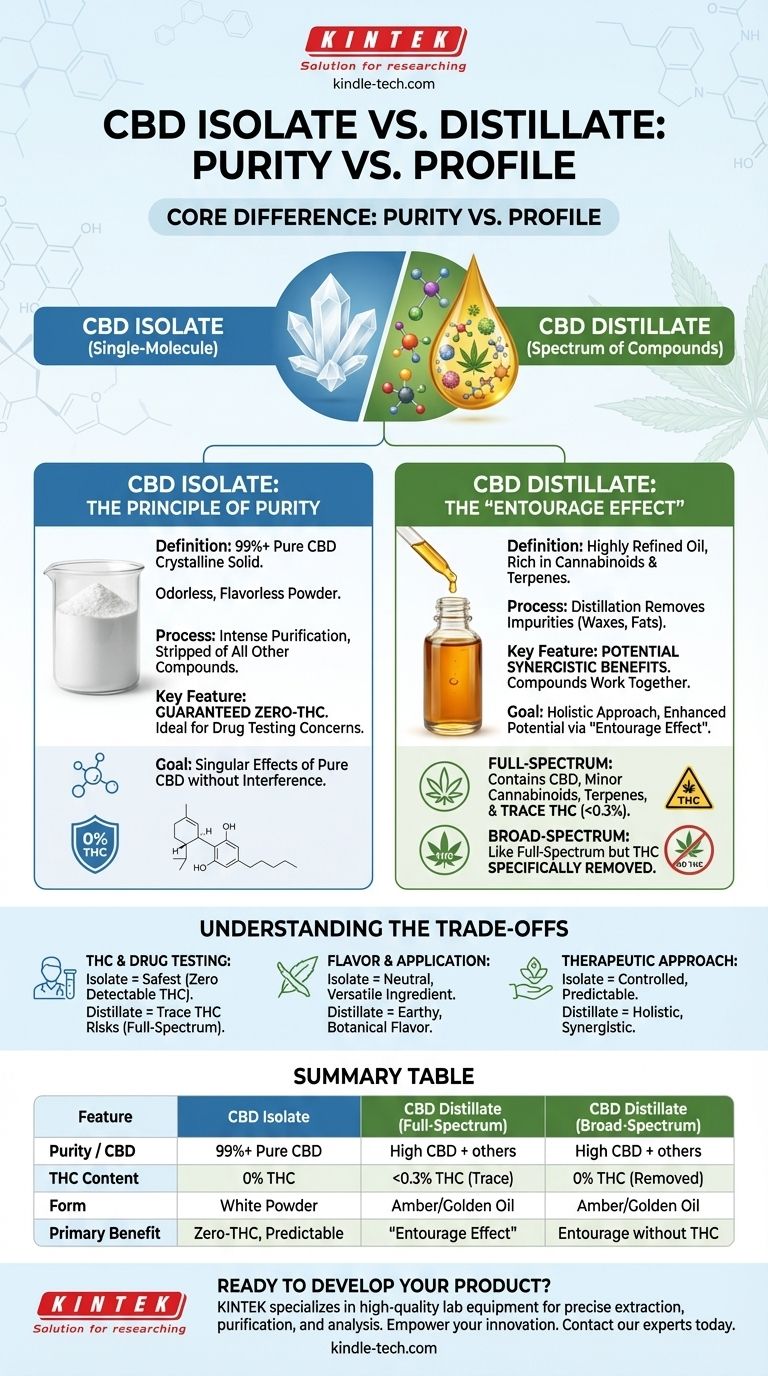
Related Products
- Laboratory Hybrid Tissue Grinding Mill
- Assemble Lab Cylindrical Press Mold
- Cylindrical Press Mold with Scale for Lab
- Polygon Press Mold for Lab
- Laboratory High Pressure Horizontal Autoclave Steam Sterilizer for Lab Use
People Also Ask
- Why is an ultrasonic homogenizer used for LNMO samples? Ensure Accurate Particle Size Distribution Analysis
- What are the advantages and applications of sintering process? Achieve Strong, Complex Parts Efficiently
- How does a centrifuge work and for what purpose? Unlock the Power of Rapid Sample Separation
- What is the difference between VAR and ESR? A Guide to Understanding Tail Risk in Financial Modeling
- What causes sputtering when accelerating? Fix Engine Hesitation and Misfires
- How do you store biomass pellets? Protect Fuel Quality and Ensure Safety with Proper Storage
- Why is industrial ultrasonic cleaning equipment necessary for UNS S32750 preparation? Ensure Plasma Nitriding Success
- What are the environmental impacts of metal processing? A Guide to Sustainability and Solutions

